Analyzing Income Inequality in Singapore: Social, Political Impacts
VerifiedAdded on 2023/06/15
|8
|2046
|57
Essay
AI Summary
This essay explores income inequality as a significant social issue in Singapore, examining its impact on various facets of society, including education, employment, and racial biases. It delves into the historical development of income inequality in Singapore, highlighting its effects on social, political, and economic stability. The essay utilizes conflict theory from sociology to understand the causes of income inequality, particularly focusing on the role of meritocracy and the division between skilled and unskilled labor. Furthermore, it employs the power resource theory from political science to analyze how income inequality affects political stability, voter participation, and the overall quality of democracy. The essay concludes by referencing Singapore's efforts in implementing policies to reduce income inequality and improve social outcomes, supported by various academic references.
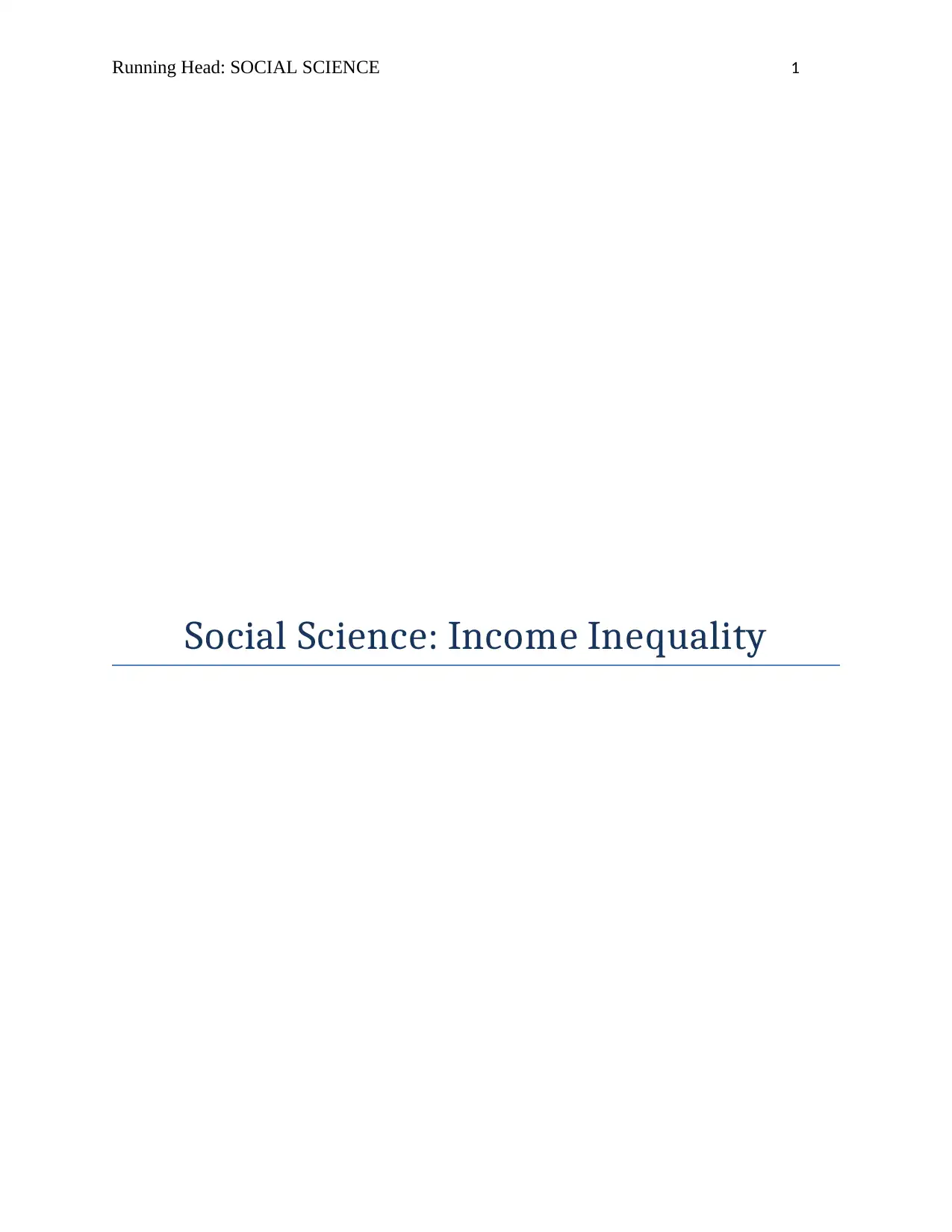
Running Head: SOCIAL SCIENCE 1
Social Science: Income Inequality
Social Science: Income Inequality
Paraphrase This Document
Need a fresh take? Get an instant paraphrase of this document with our AI Paraphraser
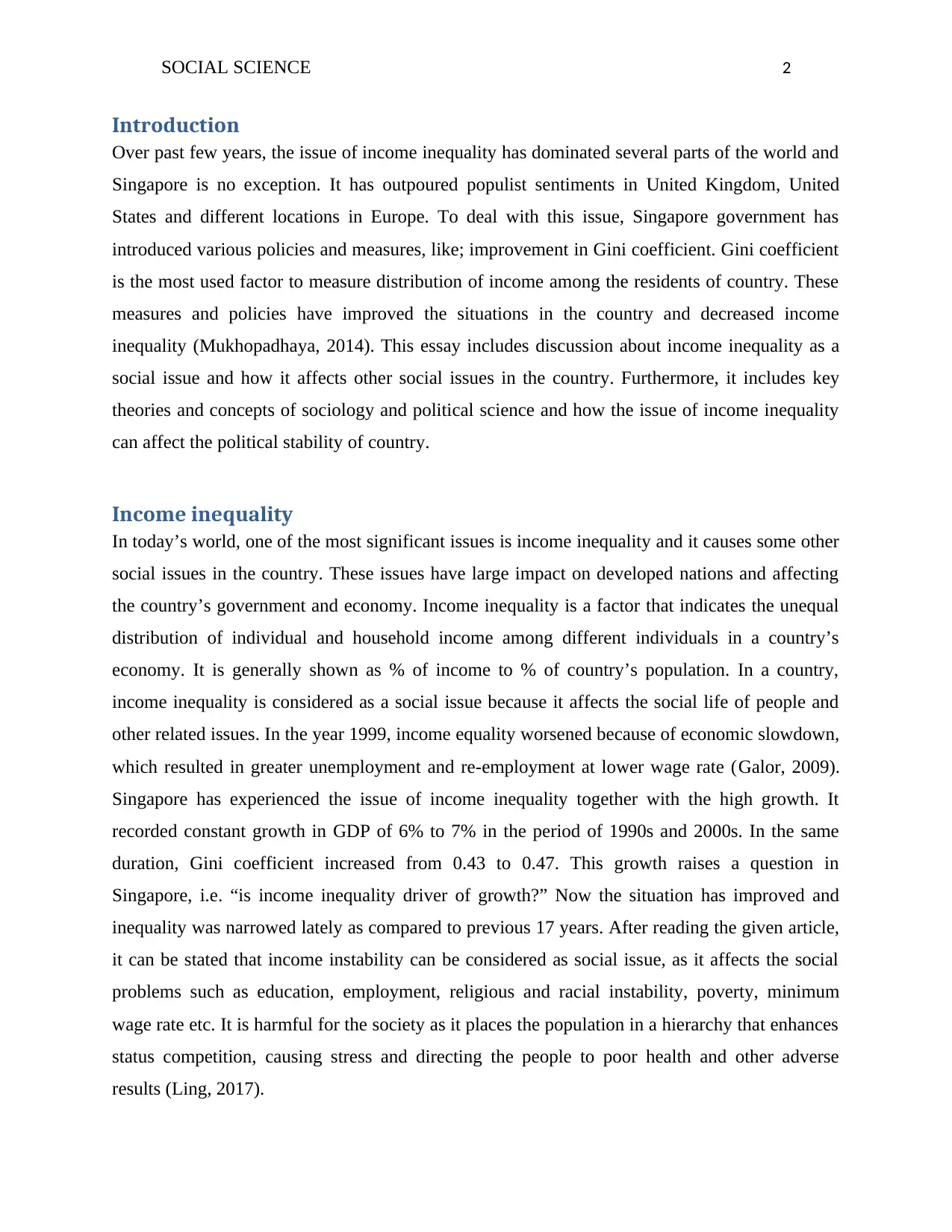
SOCIAL SCIENCE 2
Introduction
Over past few years, the issue of income inequality has dominated several parts of the world and
Singapore is no exception. It has outpoured populist sentiments in United Kingdom, United
States and different locations in Europe. To deal with this issue, Singapore government has
introduced various policies and measures, like; improvement in Gini coefficient. Gini coefficient
is the most used factor to measure distribution of income among the residents of country. These
measures and policies have improved the situations in the country and decreased income
inequality (Mukhopadhaya, 2014). This essay includes discussion about income inequality as a
social issue and how it affects other social issues in the country. Furthermore, it includes key
theories and concepts of sociology and political science and how the issue of income inequality
can affect the political stability of country.
Income inequality
In today’s world, one of the most significant issues is income inequality and it causes some other
social issues in the country. These issues have large impact on developed nations and affecting
the country’s government and economy. Income inequality is a factor that indicates the unequal
distribution of individual and household income among different individuals in a country’s
economy. It is generally shown as % of income to % of country’s population. In a country,
income inequality is considered as a social issue because it affects the social life of people and
other related issues. In the year 1999, income equality worsened because of economic slowdown,
which resulted in greater unemployment and re-employment at lower wage rate (Galor, 2009).
Singapore has experienced the issue of income inequality together with the high growth. It
recorded constant growth in GDP of 6% to 7% in the period of 1990s and 2000s. In the same
duration, Gini coefficient increased from 0.43 to 0.47. This growth raises a question in
Singapore, i.e. “is income inequality driver of growth?” Now the situation has improved and
inequality was narrowed lately as compared to previous 17 years. After reading the given article,
it can be stated that income instability can be considered as social issue, as it affects the social
problems such as education, employment, religious and racial instability, poverty, minimum
wage rate etc. It is harmful for the society as it places the population in a hierarchy that enhances
status competition, causing stress and directing the people to poor health and other adverse
results (Ling, 2017).
Introduction
Over past few years, the issue of income inequality has dominated several parts of the world and
Singapore is no exception. It has outpoured populist sentiments in United Kingdom, United
States and different locations in Europe. To deal with this issue, Singapore government has
introduced various policies and measures, like; improvement in Gini coefficient. Gini coefficient
is the most used factor to measure distribution of income among the residents of country. These
measures and policies have improved the situations in the country and decreased income
inequality (Mukhopadhaya, 2014). This essay includes discussion about income inequality as a
social issue and how it affects other social issues in the country. Furthermore, it includes key
theories and concepts of sociology and political science and how the issue of income inequality
can affect the political stability of country.
Income inequality
In today’s world, one of the most significant issues is income inequality and it causes some other
social issues in the country. These issues have large impact on developed nations and affecting
the country’s government and economy. Income inequality is a factor that indicates the unequal
distribution of individual and household income among different individuals in a country’s
economy. It is generally shown as % of income to % of country’s population. In a country,
income inequality is considered as a social issue because it affects the social life of people and
other related issues. In the year 1999, income equality worsened because of economic slowdown,
which resulted in greater unemployment and re-employment at lower wage rate (Galor, 2009).
Singapore has experienced the issue of income inequality together with the high growth. It
recorded constant growth in GDP of 6% to 7% in the period of 1990s and 2000s. In the same
duration, Gini coefficient increased from 0.43 to 0.47. This growth raises a question in
Singapore, i.e. “is income inequality driver of growth?” Now the situation has improved and
inequality was narrowed lately as compared to previous 17 years. After reading the given article,
it can be stated that income instability can be considered as social issue, as it affects the social
problems such as education, employment, religious and racial instability, poverty, minimum
wage rate etc. It is harmful for the society as it places the population in a hierarchy that enhances
status competition, causing stress and directing the people to poor health and other adverse
results (Ling, 2017).
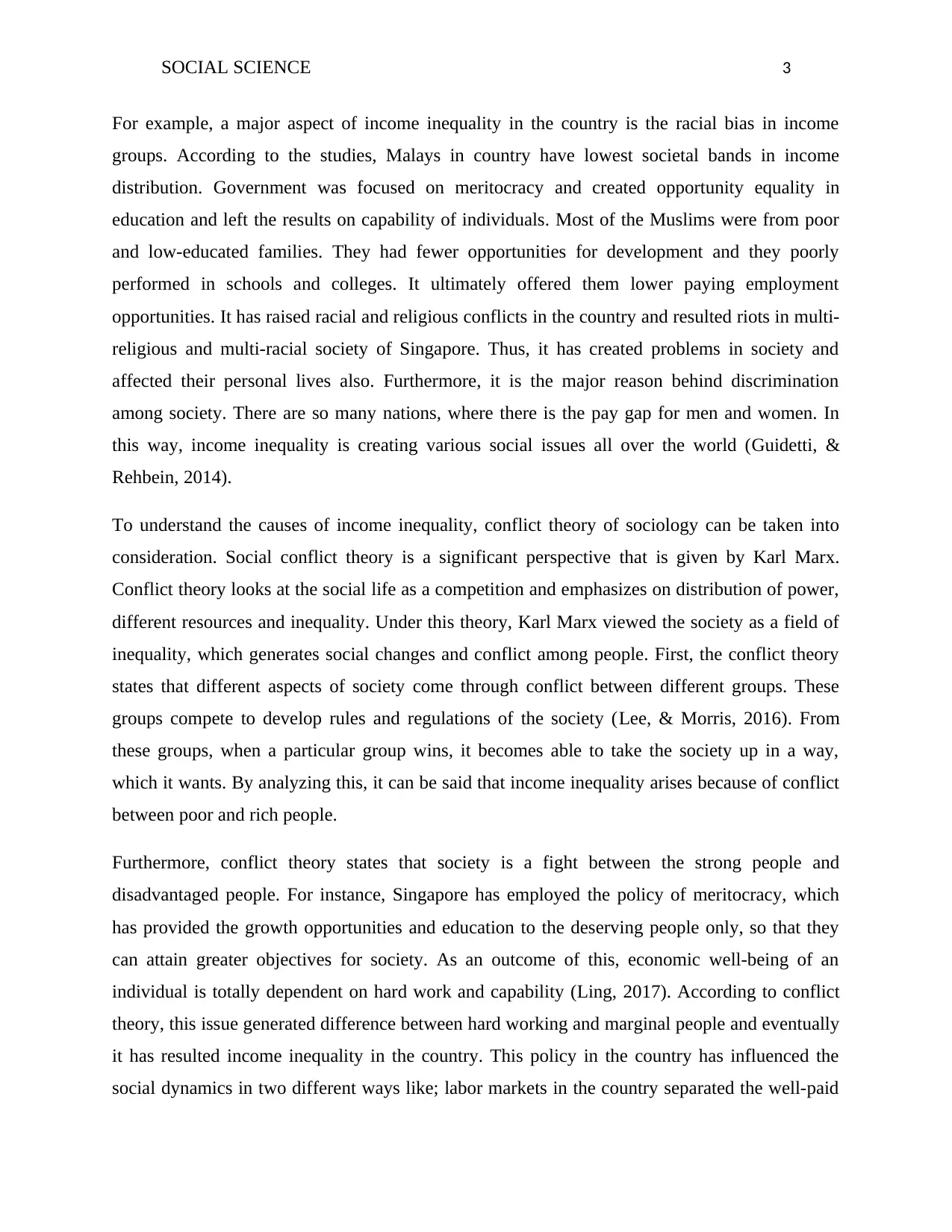
SOCIAL SCIENCE 3
For example, a major aspect of income inequality in the country is the racial bias in income
groups. According to the studies, Malays in country have lowest societal bands in income
distribution. Government was focused on meritocracy and created opportunity equality in
education and left the results on capability of individuals. Most of the Muslims were from poor
and low-educated families. They had fewer opportunities for development and they poorly
performed in schools and colleges. It ultimately offered them lower paying employment
opportunities. It has raised racial and religious conflicts in the country and resulted riots in multi-
religious and multi-racial society of Singapore. Thus, it has created problems in society and
affected their personal lives also. Furthermore, it is the major reason behind discrimination
among society. There are so many nations, where there is the pay gap for men and women. In
this way, income inequality is creating various social issues all over the world (Guidetti, &
Rehbein, 2014).
To understand the causes of income inequality, conflict theory of sociology can be taken into
consideration. Social conflict theory is a significant perspective that is given by Karl Marx.
Conflict theory looks at the social life as a competition and emphasizes on distribution of power,
different resources and inequality. Under this theory, Karl Marx viewed the society as a field of
inequality, which generates social changes and conflict among people. First, the conflict theory
states that different aspects of society come through conflict between different groups. These
groups compete to develop rules and regulations of the society (Lee, & Morris, 2016). From
these groups, when a particular group wins, it becomes able to take the society up in a way,
which it wants. By analyzing this, it can be said that income inequality arises because of conflict
between poor and rich people.
Furthermore, conflict theory states that society is a fight between the strong people and
disadvantaged people. For instance, Singapore has employed the policy of meritocracy, which
has provided the growth opportunities and education to the deserving people only, so that they
can attain greater objectives for society. As an outcome of this, economic well-being of an
individual is totally dependent on hard work and capability (Ling, 2017). According to conflict
theory, this issue generated difference between hard working and marginal people and eventually
it has resulted income inequality in the country. This policy in the country has influenced the
social dynamics in two different ways like; labor markets in the country separated the well-paid
For example, a major aspect of income inequality in the country is the racial bias in income
groups. According to the studies, Malays in country have lowest societal bands in income
distribution. Government was focused on meritocracy and created opportunity equality in
education and left the results on capability of individuals. Most of the Muslims were from poor
and low-educated families. They had fewer opportunities for development and they poorly
performed in schools and colleges. It ultimately offered them lower paying employment
opportunities. It has raised racial and religious conflicts in the country and resulted riots in multi-
religious and multi-racial society of Singapore. Thus, it has created problems in society and
affected their personal lives also. Furthermore, it is the major reason behind discrimination
among society. There are so many nations, where there is the pay gap for men and women. In
this way, income inequality is creating various social issues all over the world (Guidetti, &
Rehbein, 2014).
To understand the causes of income inequality, conflict theory of sociology can be taken into
consideration. Social conflict theory is a significant perspective that is given by Karl Marx.
Conflict theory looks at the social life as a competition and emphasizes on distribution of power,
different resources and inequality. Under this theory, Karl Marx viewed the society as a field of
inequality, which generates social changes and conflict among people. First, the conflict theory
states that different aspects of society come through conflict between different groups. These
groups compete to develop rules and regulations of the society (Lee, & Morris, 2016). From
these groups, when a particular group wins, it becomes able to take the society up in a way,
which it wants. By analyzing this, it can be said that income inequality arises because of conflict
between poor and rich people.
Furthermore, conflict theory states that society is a fight between the strong people and
disadvantaged people. For instance, Singapore has employed the policy of meritocracy, which
has provided the growth opportunities and education to the deserving people only, so that they
can attain greater objectives for society. As an outcome of this, economic well-being of an
individual is totally dependent on hard work and capability (Ling, 2017). According to conflict
theory, this issue generated difference between hard working and marginal people and eventually
it has resulted income inequality in the country. This policy in the country has influenced the
social dynamics in two different ways like; labor markets in the country separated the well-paid
⊘ This is a preview!⊘
Do you want full access?
Subscribe today to unlock all pages.

Trusted by 1+ million students worldwide
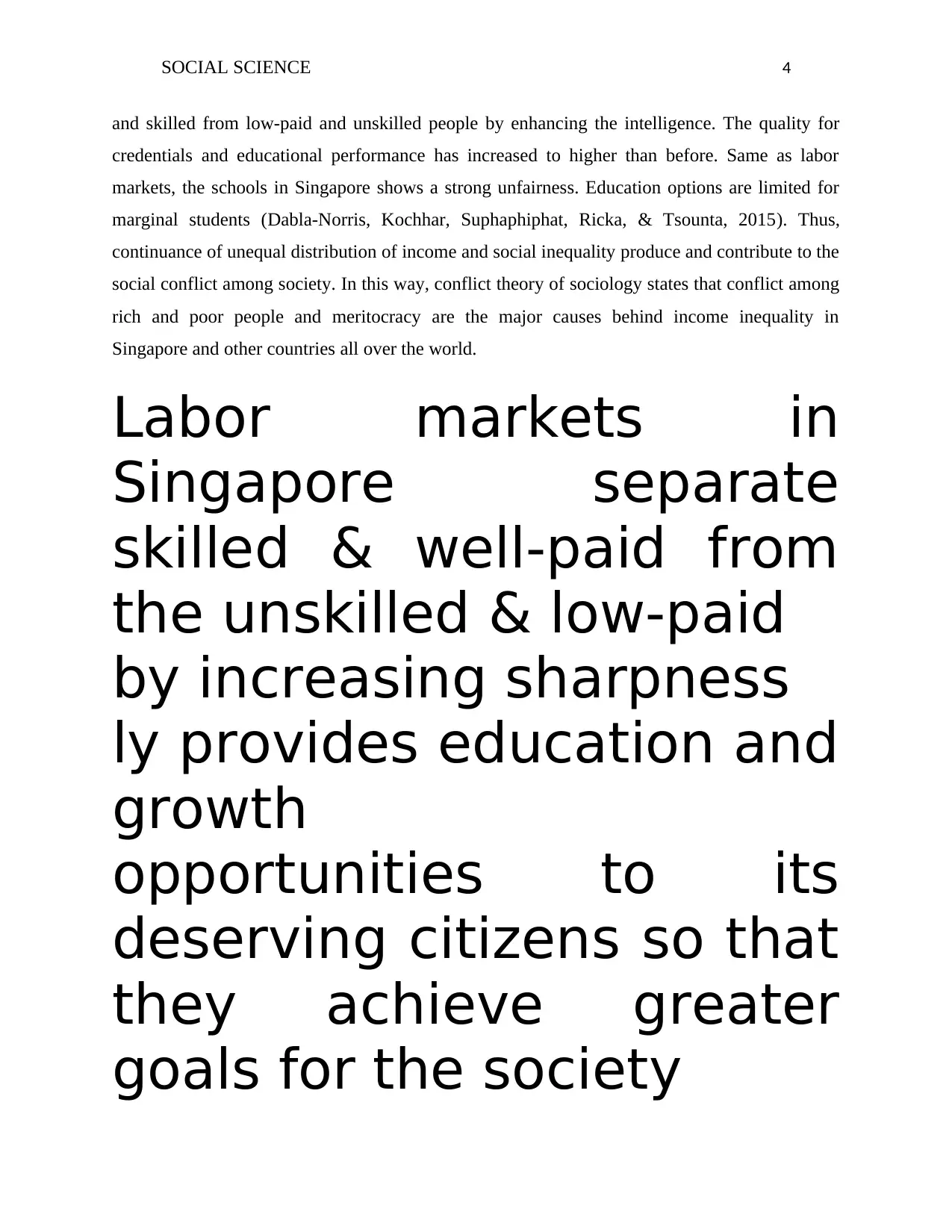
SOCIAL SCIENCE 4
and skilled from low-paid and unskilled people by enhancing the intelligence. The quality for
credentials and educational performance has increased to higher than before. Same as labor
markets, the schools in Singapore shows a strong unfairness. Education options are limited for
marginal students (Dabla-Norris, Kochhar, Suphaphiphat, Ricka, & Tsounta, 2015). Thus,
continuance of unequal distribution of income and social inequality produce and contribute to the
social conflict among society. In this way, conflict theory of sociology states that conflict among
rich and poor people and meritocracy are the major causes behind income inequality in
Singapore and other countries all over the world.
Labor markets in
Singapore separate
skilled & well-paid from
the unskilled & low-paid
by increasing sharpness
ly provides education and
growth
opportunities to its
deserving citizens so that
they achieve greater
goals for the society
and skilled from low-paid and unskilled people by enhancing the intelligence. The quality for
credentials and educational performance has increased to higher than before. Same as labor
markets, the schools in Singapore shows a strong unfairness. Education options are limited for
marginal students (Dabla-Norris, Kochhar, Suphaphiphat, Ricka, & Tsounta, 2015). Thus,
continuance of unequal distribution of income and social inequality produce and contribute to the
social conflict among society. In this way, conflict theory of sociology states that conflict among
rich and poor people and meritocracy are the major causes behind income inequality in
Singapore and other countries all over the world.
Labor markets in
Singapore separate
skilled & well-paid from
the unskilled & low-paid
by increasing sharpness
ly provides education and
growth
opportunities to its
deserving citizens so that
they achieve greater
goals for the society
Paraphrase This Document
Need a fresh take? Get an instant paraphrase of this document with our AI Paraphraser
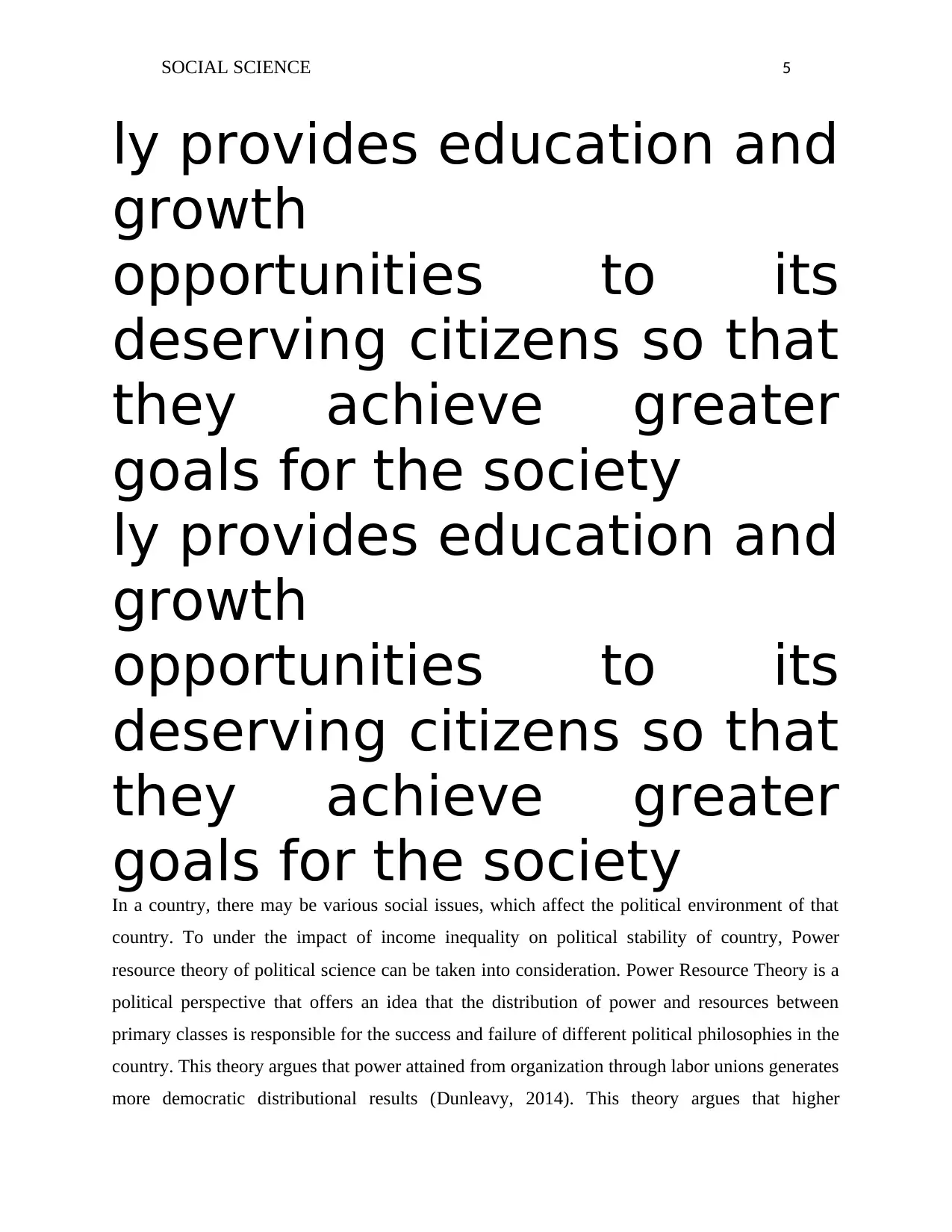
SOCIAL SCIENCE 5
ly provides education and
growth
opportunities to its
deserving citizens so that
they achieve greater
goals for the society
ly provides education and
growth
opportunities to its
deserving citizens so that
they achieve greater
goals for the society
In a country, there may be various social issues, which affect the political environment of that
country. To under the impact of income inequality on political stability of country, Power
resource theory of political science can be taken into consideration. Power Resource Theory is a
political perspective that offers an idea that the distribution of power and resources between
primary classes is responsible for the success and failure of different political philosophies in the
country. This theory argues that power attained from organization through labor unions generates
more democratic distributional results (Dunleavy, 2014). This theory argues that higher
ly provides education and
growth
opportunities to its
deserving citizens so that
they achieve greater
goals for the society
ly provides education and
growth
opportunities to its
deserving citizens so that
they achieve greater
goals for the society
In a country, there may be various social issues, which affect the political environment of that
country. To under the impact of income inequality on political stability of country, Power
resource theory of political science can be taken into consideration. Power Resource Theory is a
political perspective that offers an idea that the distribution of power and resources between
primary classes is responsible for the success and failure of different political philosophies in the
country. This theory argues that power attained from organization through labor unions generates
more democratic distributional results (Dunleavy, 2014). This theory argues that higher
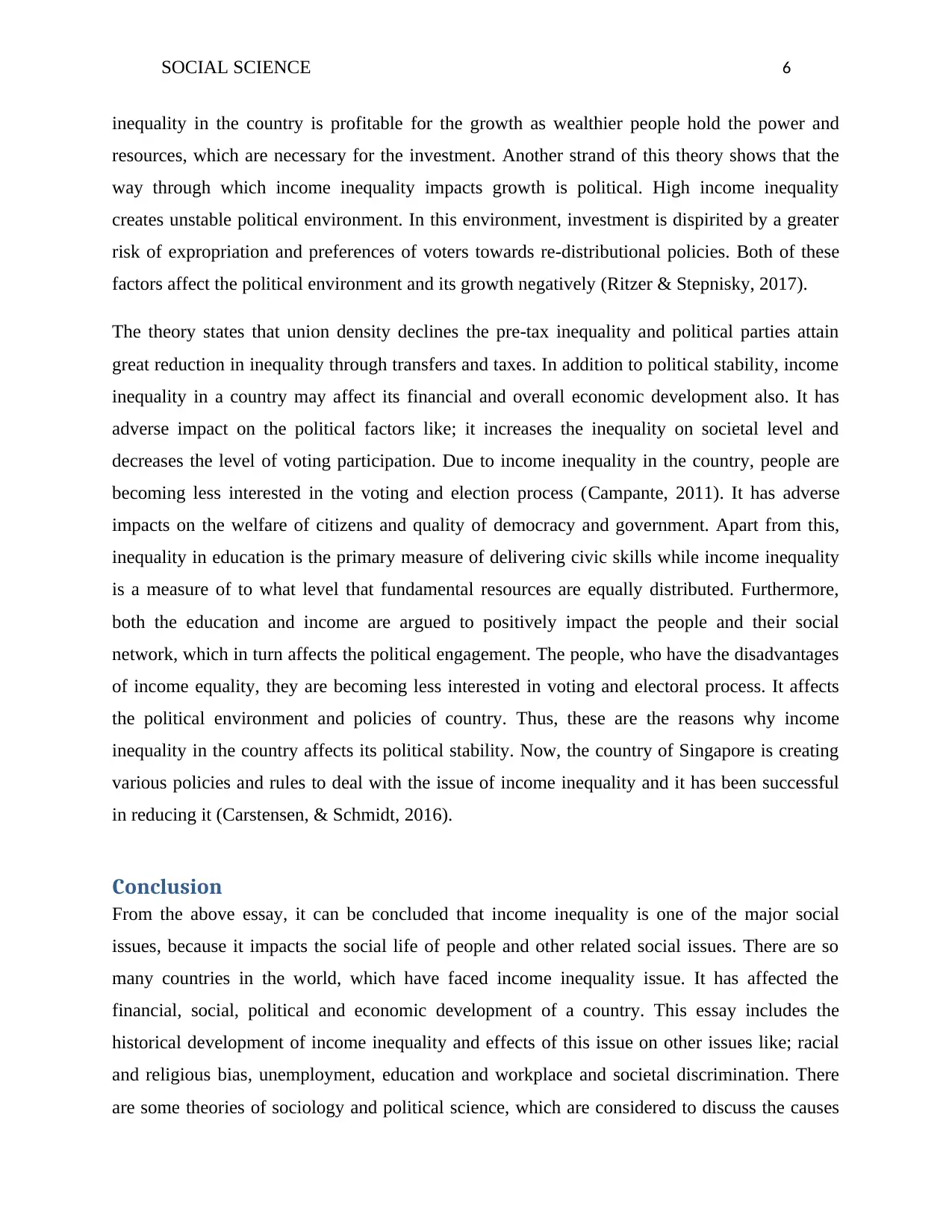
SOCIAL SCIENCE 6
inequality in the country is profitable for the growth as wealthier people hold the power and
resources, which are necessary for the investment. Another strand of this theory shows that the
way through which income inequality impacts growth is political. High income inequality
creates unstable political environment. In this environment, investment is dispirited by a greater
risk of expropriation and preferences of voters towards re-distributional policies. Both of these
factors affect the political environment and its growth negatively (Ritzer & Stepnisky, 2017).
The theory states that union density declines the pre-tax inequality and political parties attain
great reduction in inequality through transfers and taxes. In addition to political stability, income
inequality in a country may affect its financial and overall economic development also. It has
adverse impact on the political factors like; it increases the inequality on societal level and
decreases the level of voting participation. Due to income inequality in the country, people are
becoming less interested in the voting and election process (Campante, 2011). It has adverse
impacts on the welfare of citizens and quality of democracy and government. Apart from this,
inequality in education is the primary measure of delivering civic skills while income inequality
is a measure of to what level that fundamental resources are equally distributed. Furthermore,
both the education and income are argued to positively impact the people and their social
network, which in turn affects the political engagement. The people, who have the disadvantages
of income equality, they are becoming less interested in voting and electoral process. It affects
the political environment and policies of country. Thus, these are the reasons why income
inequality in the country affects its political stability. Now, the country of Singapore is creating
various policies and rules to deal with the issue of income inequality and it has been successful
in reducing it (Carstensen, & Schmidt, 2016).
Conclusion
From the above essay, it can be concluded that income inequality is one of the major social
issues, because it impacts the social life of people and other related social issues. There are so
many countries in the world, which have faced income inequality issue. It has affected the
financial, social, political and economic development of a country. This essay includes the
historical development of income inequality and effects of this issue on other issues like; racial
and religious bias, unemployment, education and workplace and societal discrimination. There
are some theories of sociology and political science, which are considered to discuss the causes
inequality in the country is profitable for the growth as wealthier people hold the power and
resources, which are necessary for the investment. Another strand of this theory shows that the
way through which income inequality impacts growth is political. High income inequality
creates unstable political environment. In this environment, investment is dispirited by a greater
risk of expropriation and preferences of voters towards re-distributional policies. Both of these
factors affect the political environment and its growth negatively (Ritzer & Stepnisky, 2017).
The theory states that union density declines the pre-tax inequality and political parties attain
great reduction in inequality through transfers and taxes. In addition to political stability, income
inequality in a country may affect its financial and overall economic development also. It has
adverse impact on the political factors like; it increases the inequality on societal level and
decreases the level of voting participation. Due to income inequality in the country, people are
becoming less interested in the voting and election process (Campante, 2011). It has adverse
impacts on the welfare of citizens and quality of democracy and government. Apart from this,
inequality in education is the primary measure of delivering civic skills while income inequality
is a measure of to what level that fundamental resources are equally distributed. Furthermore,
both the education and income are argued to positively impact the people and their social
network, which in turn affects the political engagement. The people, who have the disadvantages
of income equality, they are becoming less interested in voting and electoral process. It affects
the political environment and policies of country. Thus, these are the reasons why income
inequality in the country affects its political stability. Now, the country of Singapore is creating
various policies and rules to deal with the issue of income inequality and it has been successful
in reducing it (Carstensen, & Schmidt, 2016).
Conclusion
From the above essay, it can be concluded that income inequality is one of the major social
issues, because it impacts the social life of people and other related social issues. There are so
many countries in the world, which have faced income inequality issue. It has affected the
financial, social, political and economic development of a country. This essay includes the
historical development of income inequality and effects of this issue on other issues like; racial
and religious bias, unemployment, education and workplace and societal discrimination. There
are some theories of sociology and political science, which are considered to discuss the causes
⊘ This is a preview!⊘
Do you want full access?
Subscribe today to unlock all pages.

Trusted by 1+ million students worldwide
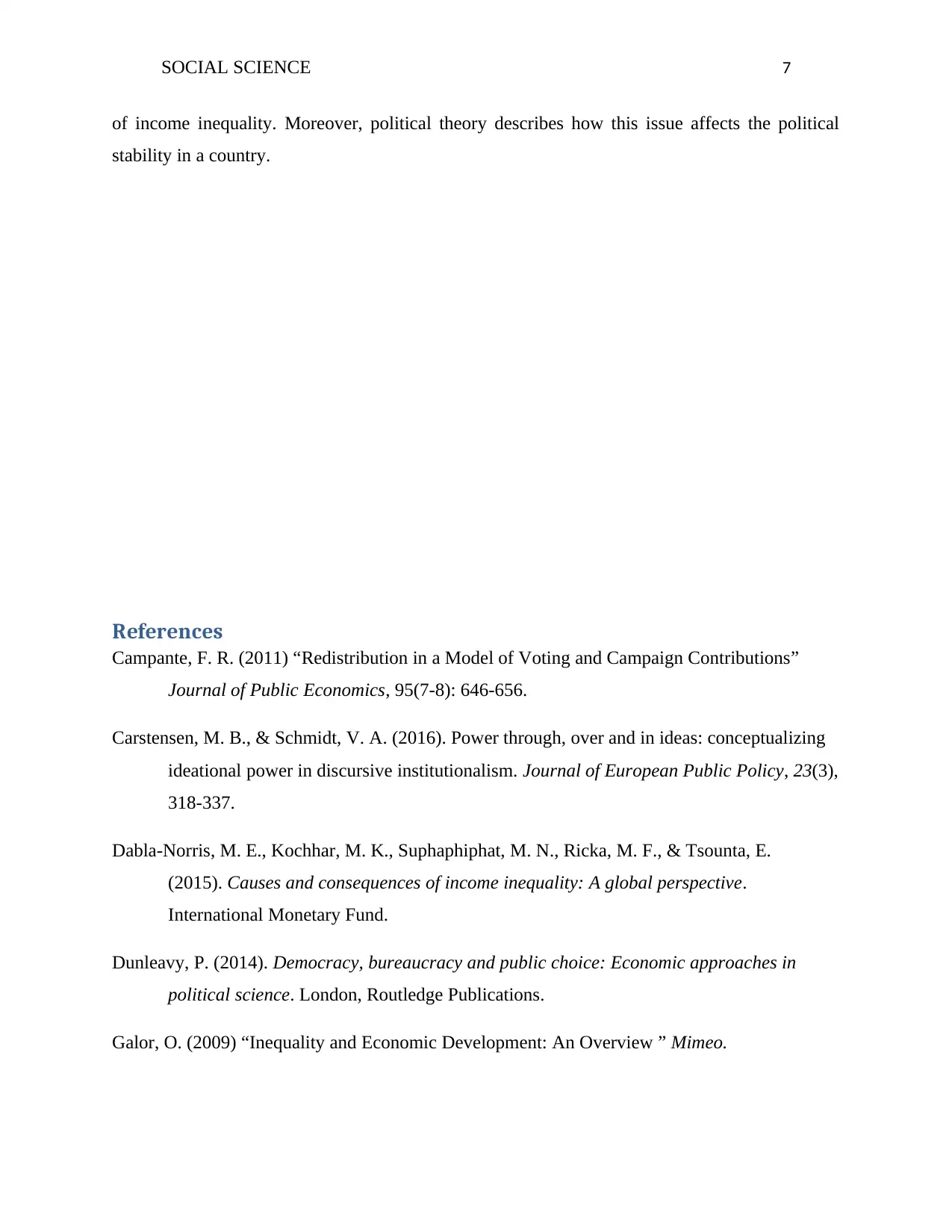
SOCIAL SCIENCE 7
of income inequality. Moreover, political theory describes how this issue affects the political
stability in a country.
References
Campante, F. R. (2011) “Redistribution in a Model of Voting and Campaign Contributions”
Journal of Public Economics, 95(7-8): 646-656.
Carstensen, M. B., & Schmidt, V. A. (2016). Power through, over and in ideas: conceptualizing
ideational power in discursive institutionalism. Journal of European Public Policy, 23(3),
318-337.
Dabla-Norris, M. E., Kochhar, M. K., Suphaphiphat, M. N., Ricka, M. F., & Tsounta, E.
(2015). Causes and consequences of income inequality: A global perspective.
International Monetary Fund.
Dunleavy, P. (2014). Democracy, bureaucracy and public choice: Economic approaches in
political science. London, Routledge Publications.
Galor, O. (2009) “Inequality and Economic Development: An Overview ” Mimeo.
of income inequality. Moreover, political theory describes how this issue affects the political
stability in a country.
References
Campante, F. R. (2011) “Redistribution in a Model of Voting and Campaign Contributions”
Journal of Public Economics, 95(7-8): 646-656.
Carstensen, M. B., & Schmidt, V. A. (2016). Power through, over and in ideas: conceptualizing
ideational power in discursive institutionalism. Journal of European Public Policy, 23(3),
318-337.
Dabla-Norris, M. E., Kochhar, M. K., Suphaphiphat, M. N., Ricka, M. F., & Tsounta, E.
(2015). Causes and consequences of income inequality: A global perspective.
International Monetary Fund.
Dunleavy, P. (2014). Democracy, bureaucracy and public choice: Economic approaches in
political science. London, Routledge Publications.
Galor, O. (2009) “Inequality and Economic Development: An Overview ” Mimeo.
Paraphrase This Document
Need a fresh take? Get an instant paraphrase of this document with our AI Paraphraser
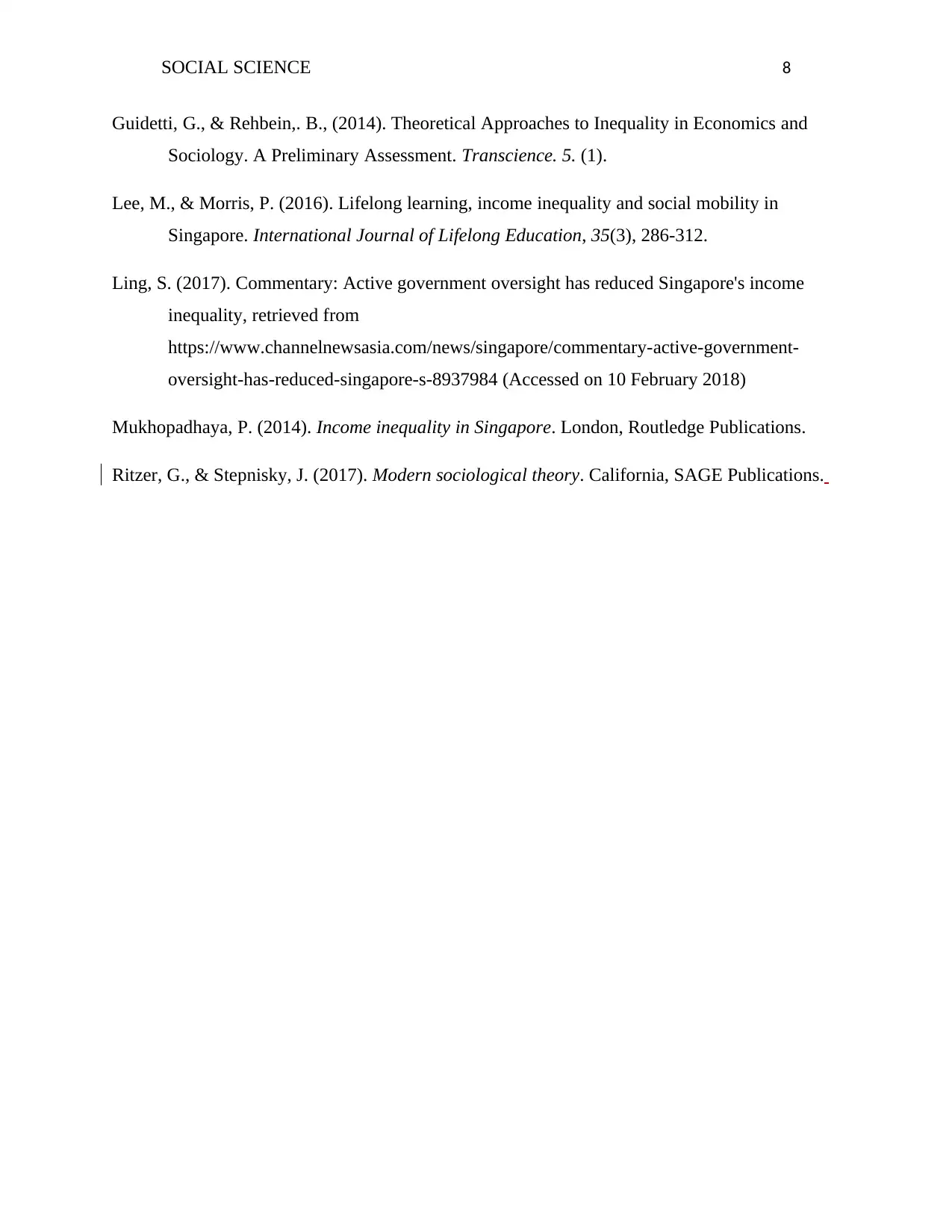
SOCIAL SCIENCE 8
Guidetti, G., & Rehbein,. B., (2014). Theoretical Approaches to Inequality in Economics and
Sociology. A Preliminary Assessment. Transcience. 5. (1).
Lee, M., & Morris, P. (2016). Lifelong learning, income inequality and social mobility in
Singapore. International Journal of Lifelong Education, 35(3), 286-312.
Ling, S. (2017). Commentary: Active government oversight has reduced Singapore's income
inequality, retrieved from
https://www.channelnewsasia.com/news/singapore/commentary-active-government-
oversight-has-reduced-singapore-s-8937984 (Accessed on 10 February 2018)
Mukhopadhaya, P. (2014). Income inequality in Singapore. London, Routledge Publications.
Ritzer, G., & Stepnisky, J. (2017). Modern sociological theory. California, SAGE Publications.
Guidetti, G., & Rehbein,. B., (2014). Theoretical Approaches to Inequality in Economics and
Sociology. A Preliminary Assessment. Transcience. 5. (1).
Lee, M., & Morris, P. (2016). Lifelong learning, income inequality and social mobility in
Singapore. International Journal of Lifelong Education, 35(3), 286-312.
Ling, S. (2017). Commentary: Active government oversight has reduced Singapore's income
inequality, retrieved from
https://www.channelnewsasia.com/news/singapore/commentary-active-government-
oversight-has-reduced-singapore-s-8937984 (Accessed on 10 February 2018)
Mukhopadhaya, P. (2014). Income inequality in Singapore. London, Routledge Publications.
Ritzer, G., & Stepnisky, J. (2017). Modern sociological theory. California, SAGE Publications.
1 out of 8
Related Documents
Your All-in-One AI-Powered Toolkit for Academic Success.
+13062052269
info@desklib.com
Available 24*7 on WhatsApp / Email
![[object Object]](/_next/static/media/star-bottom.7253800d.svg)
Unlock your academic potential
Copyright © 2020–2026 A2Z Services. All Rights Reserved. Developed and managed by ZUCOL.





